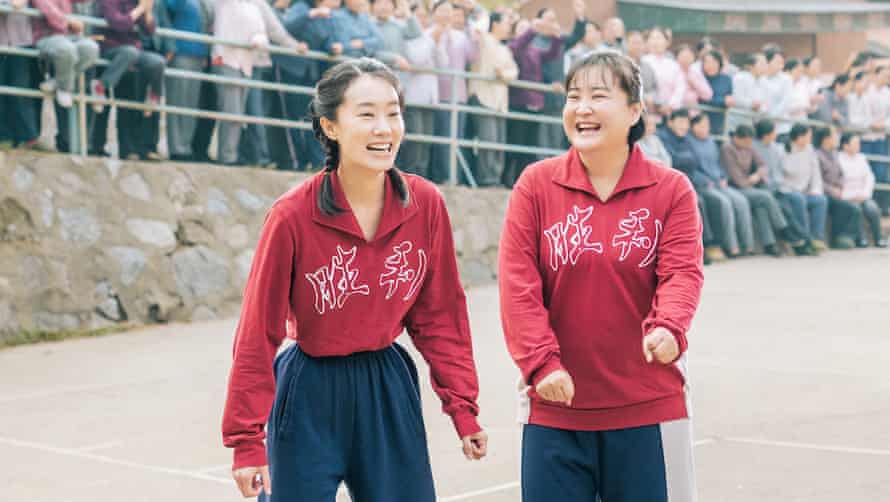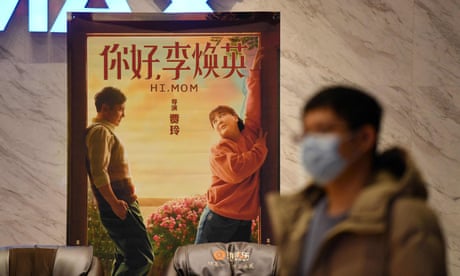I took my parents to see the Chinese film Hi, Mom. I wasn’t prepared for the tears
Bec Zhuang
As the credits rolled on Jia Ling’s hit comedy, Bec Zhuang saw her father crying for one of the first times in her life
 Hi, Mom drew Chinese ticket sales of more than US$700m in its first fortnight. Photograph: Tiger Pictures
Hi, Mom drew Chinese ticket sales of more than US$700m in its first fortnight. Photograph: Tiger PicturesTue 11 May 2021 11.36 AEST
Sitting in the dimly lit cinema, I reach for my parents’ hands on either side of me.
My Dad (Ba) sits to my left and my Mum (Ma) to the right. The credits roll past in the usual blur – but instead of focusing on the names I glance between my parents, each bearing tear-soaked faces just like mine.
It’s 6pm on a Sunday evening in a Hornsby cinema. You wouldn’t normally find my family here. Coming from a family of indulgent foodies, our weekend get-togethers typically revolve around slurping noodles or barbequing meats; plus, nearly every film Ba begins ends with his snoring.
But on this weekend, the cinema happened to be screening a film in my parents’ native tongue – and we just happened to be in the possession of a couple of NSW Dine & Discover vouchers.

Mum's the word: hit Chinese film Hi Mom sparks debate about motherhood
Read more
We decided to watch Hi, Mom: a 2021 Chinese comedy directed by and starring Jia Ling. Made in tribute to Jia’s mother and based on her own life, the film follows a bumbling teenage girl on a time-travelling quest to make her late mother proud.
What starts out as a comedic, slice-of-life drama slowly morphs into a tear-jerking exploration of grief, regret and filial piety. The main character Xiaoling (Jia Ling) strives to rewrite her personal history by absolving the guilt of never accomplishing or amounting to anything while her mother was alive.
The film has been something of a sensation in China, where it drew ticket sales of more than US$700m in its first fortnight, and has sparked conversations about womanhood and parenting. I was excited to watch it with my parents, and keen to challenge myself with a film in Mandarin while resisting English subtitles. It’s the first Chinese film I’ve seen in mainstream Australian cinemas, and I was happy it was so accessible. But nothing could have quite prepared me for the emotional response we shared.
I can count on one hand the number of times I’ve seen Ba cry. In fact, it’s such a rarity that the first time it happened is deeply embedded in my memory.
At 15, I was in the midst of what my parents would describe as a teenage rebellion. It was a rebellion that involved my grades slipping from an A+ to a B-, and a not-so-inconspicuous dive into a world of goon sacks, kohl-black eyeliner and sneaking out.
Coming from a conservative Chinese upbringing, my parents struggled with what to do with my sudden surge of hormonal angst. Around this time, most conversations ended with Ma and I in tears as we struggled to communicate how we felt, while Ba would remain calm, only occasionally omitting an exasperated sigh.
At the time, I struggled with not wanting to let my parents down, but also wanting to have fun. My parents struggled with a concern for my wellbeing; they wanted to discipline me, but they also wanted me to experience the teenagehood they never had.
I remember the strongest pang of guilt when I saw his reddened face back then; his face a mix of anger and hurt as he struggled to keep his voice from wavering. Back then, just as in the cinema, I felt an overwhelming desire to wrap my arms around him to make it better.
At 15, I cursed myself for causing my parents pain. Similarly to Xiaoling, I felt an immense pressure to live a life that made my parents proud and, in my naivety, I thought this was only possible through exemplary grades, a law degree and a perfect score in AMEB piano.
But what I’ve come to realise as I’ve gotten older – and what is the strongest message of Hi, Mom – is that parental love does not simply dissipate with a bad test grade or a streak of teenage rebellion. Oftentimes, the strongest perception of what makes our parents proud is fabricated in our own heads.
At the end of the film, Xiaoling realises her late mother wouldn’t have traded her for the world. Merely existing as her daughter was enough to make her proud.
Unlike many Chinese families who are reluctant to talk about how they feel, I am lucky my parents are vulnerable enough to open up. As a family, we’ve learned a lot over the years: from struggling to communicate to now being able to freely express our love and pride for each other. Sitting in the dimly lit cinema of Westfield Hornsby, I felt truly grateful for that.
Hi, Mom is in selected cinemas around Australia now
No comments:
Post a Comment
Note: Only a member of this blog may post a comment.